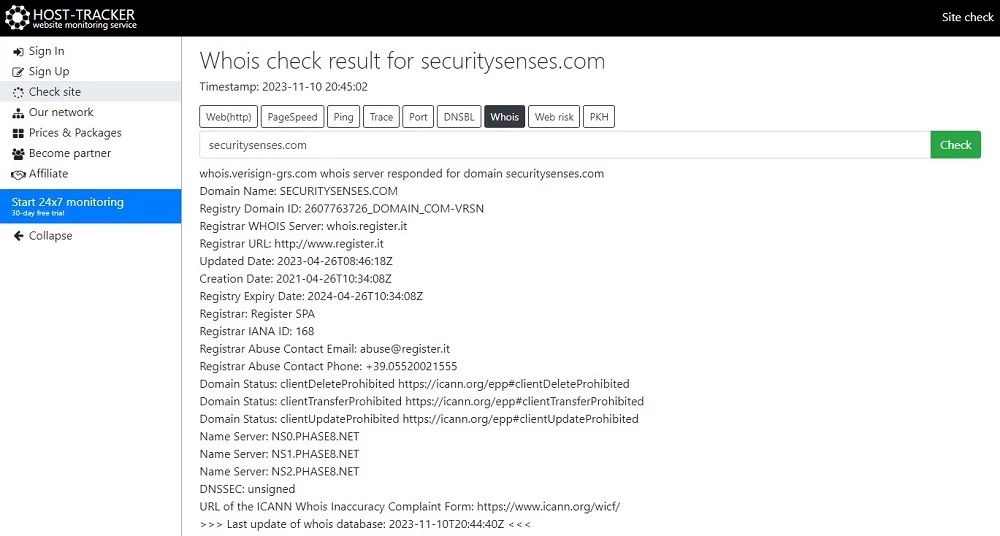How to Find Out Hosting of Website?
The hosting provider is an important piece of a website's backend infrastructure. But if you come across a website, how can you find out which company or service hosts it? This article will outline several methods to identify the hosting provider behind any website, including the use of online tools, DNS record analysis, source code inspection, and contacting the website owner.
Determining a website's hosting can be valuable for research, troubleshooting performance issues, evaluating security, and making decisions about your own site's infrastructure. Follow along as we walk through the steps to find out the hosting provider powering any website.
Website Hosting: Briefly about the Main Thing
Website hosting is a foundational service that allows individuals and organizations to post a website or web page onto the Internet. When we talk about web hosting, we're referring to companies that provide the technologies and services needed for the website or webpage to be viewed on the Internet. Websites are hosted, or stored, on special computers called servers.
When it comes to types of web hosting, there are several options, each with its own benefits:
- Shared Hosting: This is where multiple websites share the same server, making it a cost-effective solution for small to medium-sized websites.
- Virtual Private Server (VPS) Hosting: A VPS provides a nice middle ground between shared hosting and having your own dedicated server, offering a balance of cost, control, and performance.
- Dedicated Hosting: With dedicated hosting, you have an entire server to yourself, providing maximum control and performance.
- Cloud Hosting: This is a more modern type of website hosting services that allows for powerful, scalable, and reliable hosting based on clustered load-balanced servers and utility billing.
Understanding these types of web hosting can help businesses and individuals choose the right hosting services for their websites, considering factors such as website size, traffic, and budget.
Reasons to Identify a Website’s Hosting Provider
Identifying a website's hosting provider can serve multiple purposes. Security-conscious individuals might seek hosting information to assess the security standards of a host, especially if a site seems compromised.
For performance troubleshooting, knowing who hosts a website can be the first step in understanding speed or uptime issues. Additionally, web developers and marketers may identify website hosting providers for competitive analysis or partnership opportunities.
The curiosity about the technological underpinnings of a successful website also drives the quest to identify website hosting provider, which could be a learning opportunity or the start of a migration or upgrade strategy.
Tools and Methods to Find Out Website Hosting
Discovering which company hosts a particular website can be accomplished through various tools and methods, each providing different levels of detail and technical insight.
Online Hosting Lookup Tools

For a quick and straightforward method how to find web host of website, online hosting lookup tools are a go-to solution. These tools, including Host-Tracker and various hosting checker tools, often require just the website's domain name to unearth hosting information. By performing a WHOIS lookup, one can obtain details about the hosting provider alongside other domain registration data. Also, this online service offers many other tools such as uptime check, traceroute online for trace checking, page loading speed check, ping and DNS check, etc.
Reading the DNS Records
For those who prefer a more hands-on approach, DNS record lookup can reveal the hosting provider behind a website. DNS records, accessible through various online tools, contain information about where a domain points to, including the nameservers and IP addresses associated with the hosting company.
Checking the Website’s Source Code
Sometimes, clues about the hosting provider are embedded within the website’s source code. By inspecting the HTML or JavaScript code of a website- often accessible through the 'inspect element' feature in web browsers - one can find comments or links suggesting the hosting service in use.
Contacting the Website Administrator
To contact a website's administrator, look for a 'Contact Us' page, which often includes a form or email address. If this isn't available, WHOIS data can sometimes provide administrative contact information, allowing you to reach out directly with inquiries about the hosting provider.
Each of these methods offers a unique avenue to find out website hosting details, catering to different levels of expertise and specific informational needs.
Legal and Privacy Considerations
When searching for a website's hosting information, it's important to navigate the boundaries of legality and privacy. Respect for privacy concerns in finding website hosting is paramount. Accessing publicly available information through WHOIS or using hosting lookup tools is generally legal.
However, digging deeper into private records without permission can lead to legal issues. Always ensure that your methods are ethical and compliant with privacy laws and regulations, maintaining a balance between curiosity and the right to privacy.
Conclusion
In conclusion, identifying a website's hosting provider can be accomplished through several reliable methods, including utilizing online hosting lookup tools like WHOIS and hosting checker tools, reading DNS records for technical details, or inspecting the website’s source code for hosting clues.
Each method offers its own advantages, catering to different user needs and technical expertise. Understanding how to find out website hosting is not only crucial for technical troubleshooting and security assessments but also beneficial for competitive analysis and educational purposes.
We encourage you to follow the ethical guidelines provided to responsibly discover hosting information. For further insights and comprehensive guides, continue to explore our website’s content and expand your digital knowledge.

